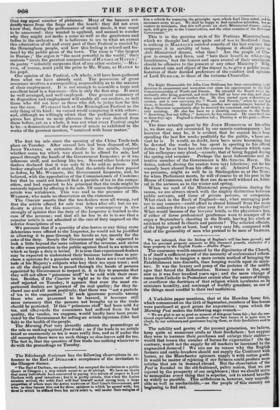The first tea sale since the opening of the China
Trade took place on Tuesday. After several lots had been disposed of, Mr. JOHN TRAVERS, an extensive dealer in the article, inquired whether some tea which was about to be offered for sale, had passed through the hands of the Government Inspector; as it was infamous stuff, and nothing like tea. Several other brokers and dealers declared that it was only fit to be sold as poison. The
broker employed to sell it stated, that the article had been passed as bohea, by Mr. Weneow, the Government Inspector, and, he
believed, with the approbation of the Commissioners of Customs; but that he could not himself find a particle of tea in the compo- sition, and had reported to his principal that the trade might be
seriously injured by offering it for sale. Of course the objectionable article was withdrawn. This was said in the presence of Mr. WYBROW, who made no observation on the statement.
The Courier asserts that the tea-dealers were all wrong, and that the article offered for sale was bohea after all ; but no au- thority is given for this assertion. Our contemporary is also strongly of opinion that the duty of the Inspector is limited to the care of the revenue; and that all he has to do is to see that a superior article is not admitted at the rate of duty imposed on the inferior descriptions of tea.
We presume that if a quantity of sloe-leaves or any thing more deleterious were offered to the Inspector, he would not be justified in allowing it to pass through his hands as tea, merely for the sake of the duty. Surely the Government might be expected to look a little beyond the mere collection of the revenue, and strive to offer some protection to the public against fraud in an article on which so large a duty is levied. It is true that experienced dealers may be expected to understand their business better than to pur- chase a spurious for a genuine article ; but there are a vast multi- tude ot his Majesty's subjects who buy their tea upon trust ; and as all the duty-paid tea is passed through the hands of persons appointed by Government to inspect it, it is fair to presume that they will not allow "poisonous stuff" to be sold with their sanc- tion. Besides, if the Courier is right as to the nature of the stuff' rejected on Tuesday, it appears that even the most ex- perienced dealers are ignorant of its real quality ; for they de- clared one and all most positively, that there was "not a particle of tea in the composition." If such ignorance prevails among those who are presumed to be learned, it becomes still more necessary that the persons not brought up to the trade should be protected. If this " poisonous stuff" had been sold for tea, and afterwards the consumers had suffered from its bad quality, the -vender, we suppose, would hardly have been prose- cuted by the Government for selling an article injurious (like bad fish) to the health of the people. The Morning Post very absurdly adduces the proceedings at the sale as making against free trade; as if the trade in an article taxed so enormously as tea is were really free, and as if under the old monopoly there were no such things as sloe-leaves sold for tea. The fact is, that the question of free trade has nothing whatever to do with the proceedings on Tuesday.
















 Previous page
Previous page